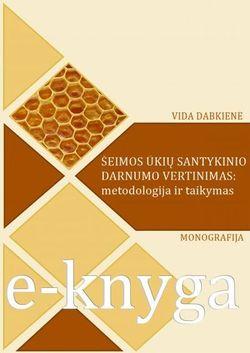
To achieve rapid increase in agricultural production and its efficiency the technological innovations (equipment, chemical materials, engineering genetics, etc.) were implemented over the last century. However, no attention was paid to the negative impact on environment and society. As a result in 1992 Rio De Janeiro world leaders summit the main sustainable farm and rural development guidelines were adopted. In the context of the sustainable development, agriculture in terms of the societal life, e.g. occupation, food protection, supply and marketing, poverty, climate change, use of the natural resources and their protection as well as protection of the biological biodiversity, etc., is considered to be one of the priorities. Agriculture related problems such as degradation of arable lands, fresh water use, fuel use, effect of greenhouse gasses emission, food production affect genetic erosion, species extinction and changes in natural habitats, etc. Consequently, to enhance farm sustainability is one of the present day EU CAP priorities. Research aim: to develop relative farm sustainability assessment tool that integrates sustainable economic, social and environmental dimensions as well as customized FADN data and perform Lithuanian family farm sustainability assessment.
Scientific research methods. The theoretical part is based on the scientific literature, analysis and synthesis, induction and deduction, and other general scientific methods of the research. Empirical research methodology was developed based on expert analysis, exploratory factor analysis, factor analysis of data, correlation analysis, sensitivity analysis, data normalization methods. Empirical research data used to interpret the graphical representation method, ANOVA and Kruskal-Wallis tests and comparative analysis. To assess the results of errors Bootstrap confidence intervals were calculated and standard deviations after 1,000 replications. The data was analysed employing SPSS 21.0 software.
The novelty of the scientific work is described by the following obtained results: an EU expert assessment was conducted, giving significance to the indicators and sustainability dimensions, sensitivity analysis was performed using the cases ranking outcomes (based on three algorithms), as well as comparing the obtained results with the assessment of Lithuanian experts; comparative analysis of the weight indicators in the composition of economic, environmental and social sub-indices factor analysis and expert evaluation methods of sensitivity analysis was completed; a comparative analysis of chemical fertilizers and GHG emissions according to the family farms’ farming types, with non-normalized results was performed; a comparative analysis for most commonly used biodiversity Simpson dominance and Shannon equitability indices was conducted; improved methodology for calculating chemical fertilizers and GHGs; improved methodology for providing thresholds of economic, environmental, social sub-indices and indices; an assessment of the relative sustainability of Lithuanian family farms was carried out according to the family farms farming type. Identified economic, environmental and social problems that could lead to political decisions that promote sustainable development of farms. The results of the empirical research revealed that the highest sustainability was found in permanent crops and horticultural farms, and the lowest in specialist cereals, oilseeds and protein crops, grazing livestock and field crops-grazing livestock combined farms. The highest economic sustainability level was achieved by field crops-grazing livestock and livestock farms. The highest environmental sustainability was performed by permanent crop farms and the lowest in specialist granivores farms. The highest social sustainability level was achieved in horticultural farms, and the lowest in various mixed farms.
Dabkienė, V. 2018. Šeimos ūkių santykinio darnumo vertinimas: metodologija ir taikymas: Mokslo monografija.- Vilnius: Lietuvos agrarinės ekonomikos institutas. 115 p. (online) ISBN 978-9955-481-68-3
